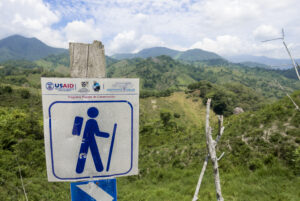The Latin America Working Group, U.S. Office on Colombia, and the Washington Office on Latin America welcome the congressional initiative – led by Representatives James McGovern and George Miller – to establish tangible steps the Colombian government should take to improve human rights before the United States considers moving forward the pending Free Trade Agreement.
“We welcome this serious initiative to lay out the achievable, near-term steps Colombia can take to improve labor rights, protect the lives of trade unionists and human rights defenders, and strengthen human rights and the rule of law,” said Lisa Haugaard, Executive Director of the Latin America Working Group.
“We strongly concur that President Obama should not ask Congress to approve the FTA before Colombia takes concrete steps to create permanent improvements in human rights. In addition, we urge efforts to mitigate the potentially devastating impacts of the agreement on vulnerable groups,” said Kelly Nicholls, Executive Director of the US Office on Colombia.
Colombia remains the most dangerous place in the world to be a trade unionist. 51 trade unionists were killed in 2010, more than the year before, according to Colombia’s National Labor School. The vast majority of these crimes remain in impunity.
“But Colombia’s trade unionists are not the only ones in danger,” said Kelly Nicholls. “A wave of violence from paramilitary and emerging criminal groups that has intensified in recent months is targeting land rights activists, human rights defenders, and Afro-Colombian and indigenous communities.”
Colombia’s new government has adopted a welcome change of tone on human rights issues from the Uribe Administration, which left office in August 2010. Rather than using harsh rhetoric that puts human rights defenders in real danger, the Santos Administration has lowered the charged tone, initiated dialogue on human rights issues, and advanced legislation to provide many victims of violence with reparations and land return.
But positive rhetoric and pending legislation have yet to translate into effective actions to address Colombia’s past and present human rights violations. The cases of the vast majority of over 3,000 civilians allegedly killed by the Colombian army, most between 2004-2008, remain stalled in Colombia’s courts; little progress has been made. The new government has not taken effective action to rein in escalating paramilitary violence nor break the continued links between members of its own armed forces and these illegal groups.
“Unless major political will is exerted to protect Afro-Colombian and Indigenous territories, violence and displacement of these communities will increase, said Gimena Sanchez-Garzoli, Senior Associate for Colombia and the Andes, Washington Office on Latin America. Over 5 million Colombians are currently displaced and an estimated 3-7 million hectares were stolen from rural farmers by illegal armed groups, drug-traffickers, and corrupt politicians who have benefited from the violence. Among the hardest-hit are Afro-Colombian and indigenous populations. More than 60 percent of the Afro-Colombians who possess legal titles to their lands are now displaced. Indigenous groups are facing a worsening threat of extinction: 32 indigenous groups have less than 500 members left. The cultural and physical extinction of ethnic minorities is due in large part to violence and displacement over the mineral wealth, natural resources and biodiversity found in their lands.
The members of Congress call on the Colombian government to take action to investigate and prosecute violence against trade unionists and other human rights defenders; demonstrate zero tolerance for gross human rights violations by official security forces, and bring Colombian labor law into compliance with international standards.
“Withholding the FTA is seen as ‘punishing’ Colombia, but it is light years from that,” said Lisa Haugaard. “Responding directly to the concerns of our Colombian civil society partners, we are asking the Santos Administration just to provide the minimal steps to ensure that Colombian trade unionists, human rights defenders and community leaders can defend their rights and live to tell the tale.”
Our organizations and coalition partners in the United States and Colombia have other serious concerns with the substance of the trade agreement. Foremost among them is the impact that the agreement will likely have on poor farmers and indigenous and Afro-Colombian communities. Having suffered the brunt of decades of violence, these communities are likely to be harshly affected by the trade agreement which is unbalanced in favor of the United States. This unfair competition will lead to a reduction of prices, cultivated areas and production in Colombia and income for already incredibly poor farmers. A complicating factor in Colombia is that farmers whose production is affected may turn to illicit crop production, and this will likely harm even the alternative development projects in which the United States has invested hundreds of millions of dollars in the last decade.
“Before moving forward with the FTA the Colombian government – with U.S. support – should design and implement policies to mitigate these negative impacts. This must be done in close consultation with Colombian civil society,” said Kelly Nicholls.
“We urge President Obama to withhold consideration of the FTA until Colombia has demonstrated that it is on the path to irreversible improvements in human rights,” said Lisa Haugaard. “We look forward to the time that we can join with our Colombian partners to say that day has come.”
XXX
For more information:
Lisa Haugaard, Latin America Working Group (work: (202) 546- 7010, cell: (301) 537-3387, lisah@lawg.org)
Kelly Nicholls, U.S. Office on Colombia (work: (202) 232- 8090, cell: (202) 460 4028, Kelly@usofficeoncolombia.org
Gimena Sanchez-Garzoli, Washington Office on Latin America (work: (202) 797-2171, cell: (202) 797-2171, gsanchez@wola.org

